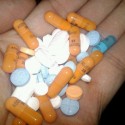Our problem with drink
The lowering of the drinking age has led to an explosion in teenage drink-driving convictions, new figures show.
Sunday Star-Times’ analysis of drink-driving convictions over the past decade show teenage New Zealanders, women and those aged 40-plus are our worst drink-drivers.
But the teen figures are the most alarming in 2006, excess breath-alcohol convictions for boys aged 17-19 were up almost 54% on 1996, and the number of girls convicted in that age group more than doubled, from 470 in 1996 to 1147 in 2006.
Industry experts are blaming the surge on the 1999 lowering of the drinking age from 20 to 18, and today’s easy access to cheap alcohol.
Massey University research has already linked the law change with increases in alcohol-related crashes and other alcohol-related offending in teenagers. Research author Taisia Huckle believes it is also to blame for the rise in drink-driving convictions. The figures prompted renewed calls for the drinking age to be returned to 20, and restricted access to alcohol.
Transport Safety Minister Harry Duynhoven said the government’s moves to introduce a zero-alcohol limit for drivers on restricted licences would go a long way to addressing problems. Otago University lecturer and leading alcohol researcher Jennie Connor suggested taxing alcohol more heavily.
She said overseas studies had shown increasing tax on ready-to-drinks (RTDs) or alcopops reduced heavy drinking in teenagers. New research about to be published in Australasian journal, the Drug and Alcohol Review, shows the sweet spirit-based drinks are closely linked with heavy drinking in young Kiwis, particularly girls.
Huckle, author of that research, said the study was the first in New Zealand to show RTDs were the “drink of choice” for young heavy drinkers.
They were taxed at a relatively low level despite having alcohol contents of up to 9%. But special taxes to make RDTs less attractive to young people in Germany had led manufacturer Bacardi to withdraw its Breezers from the market.
Connor said New Zealand lawmakers had largely ignored measures that were proven to be successful in curbing problem drinking. “The obvious thing is to raise the drinking age,” she said.
Last year, then justice minister Mark Burton announced proposals to address youth drinking after a review of the problem. The announcement came almost a year after a bill to return the drinking age to 20 was thrown out. But the proposals were widely dismissed as toothless by industry experts. They included criminalising the supply of alcohol to under 18s in a public place and implementing a “three strikes and you’re out” approach for suppliers caught selling to underage people three times in two years.
National law and order spokesman Simon Power said the focus needed to be on liquor licensing and better enforcement.
“The glaring issue for me is the proliferation of licences,” he said.
Statistics showed drugs and alcohol were involved in a huge proportion of crimes and a range of proposals to address the problem were with the party’s leader, John Key.
But neither Labour nor National would commit to putting a raised drinking age back on the agenda.
Land Transport NZ spokesman Andy Knackstedt said drink-driving remained a serious issue and accounted for a third of all crashes on New Zealand roads.
But the Star-Times’ figures suggested efforts by his authority and police were working, he said. A total of 20,919 people were convicted of drink-driving in 1996 compared to 21,450 in 2006. The 2.5% increase was due to the population increase of 11% over the same period, Knackstedt said. The number of deaths and injuries from drink-drive crashes had dropped 26.4% and 12.8% over the same period.
The figures also showed drink-drive convictions for men aged 20 to 39 had dropped more than 20% between 1996 and 2006, and had dropped slightly for women that age. But the conviction rate for women skyrocketed 75% up from 3703 in 1996 to 5010 in 2006. Men’s convictions fell slightly from 17,216 to 16,440.
Experts agreed women were increasingly engaging in risky drinking.
“Women are drunk much more now than they were,” Connor said. “There are a lot of especially young women who go out with the intention of getting blind drunk.”
This area of hazardous drinking could be addressed by better enforcement of the current liquor laws.
It was impossible for women to “get as drunk as these women do” without club and pub staff noticing and the industry needed to take responsibility and stop serving intoxicated people, she said. But it would take more than “just asking them nicely”.
Figures showed a staggering 82% increase in drink-drive convictions for women aged over 40. Convictions for men in the same group had increased 13.45%.
This was further evidence women are playing catch up to their male counterparts as heavy drinking becomes more and more socially acceptable in New Zealand, the researchers said.
Studies showed that moves to sell alcohol in supermarkets, 24-hour and Sunday trading all introduced in the 1990s had increased problem drinking across all age groups, Huckle said.
“Alcohol is marketed like any other product, but in fact it’s not it has health risks and all sorts of other risks associated with it. It’s not an ordinary commodity… But it’s all about the normalising of alcohol in New Zealand society and culture.”
Alcohol Advisory Council of New Zealand spokeswoman Wendy Moore last week told a Nelson conference its research showed some 785,000 New Zealand adults regularly indulged in binge drinking.
Teenage binge drinkers, for whom drinking had become a rite of passage, were simply aping the actions of adults, she said.
source: Sunday Star Times

